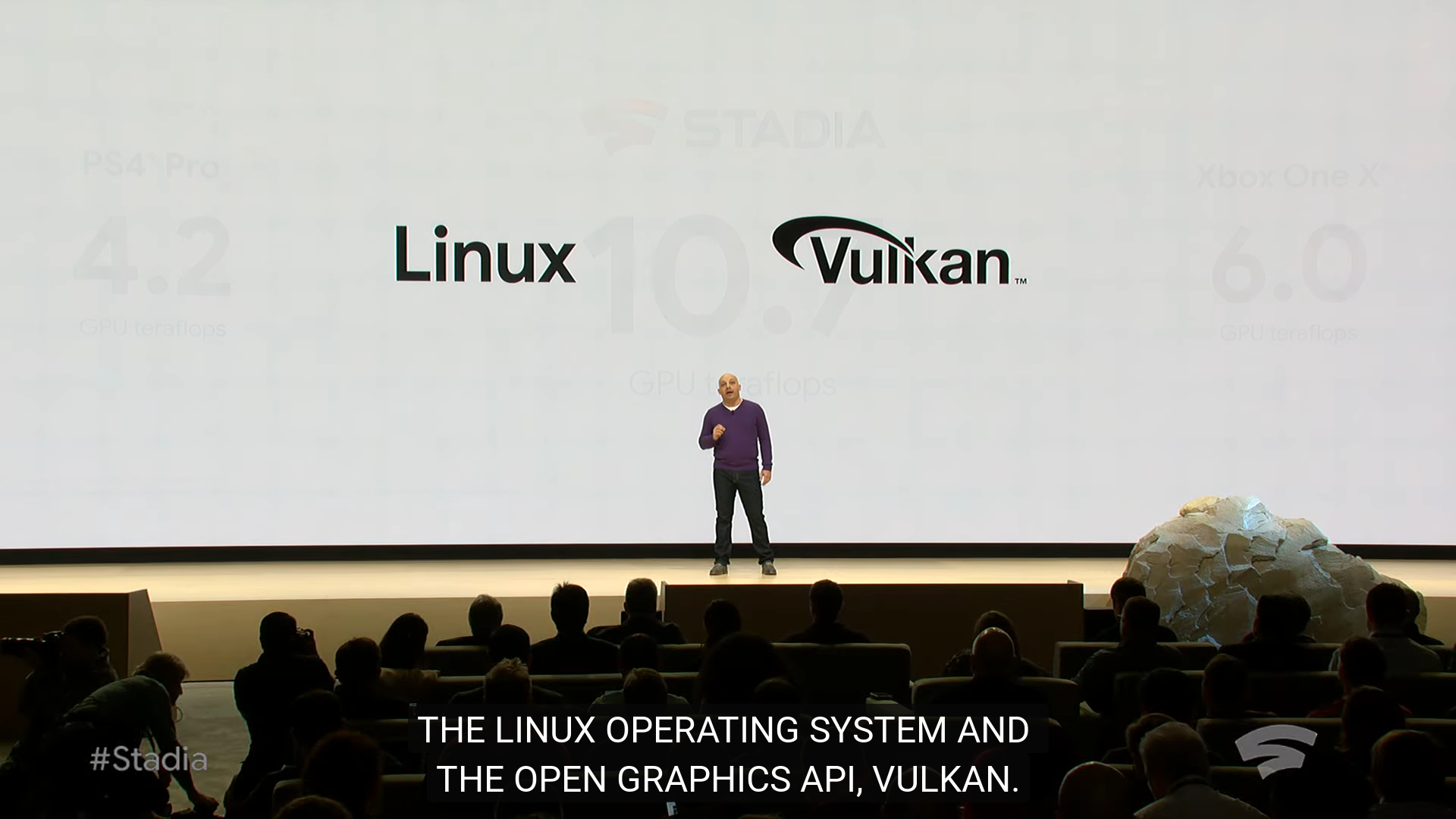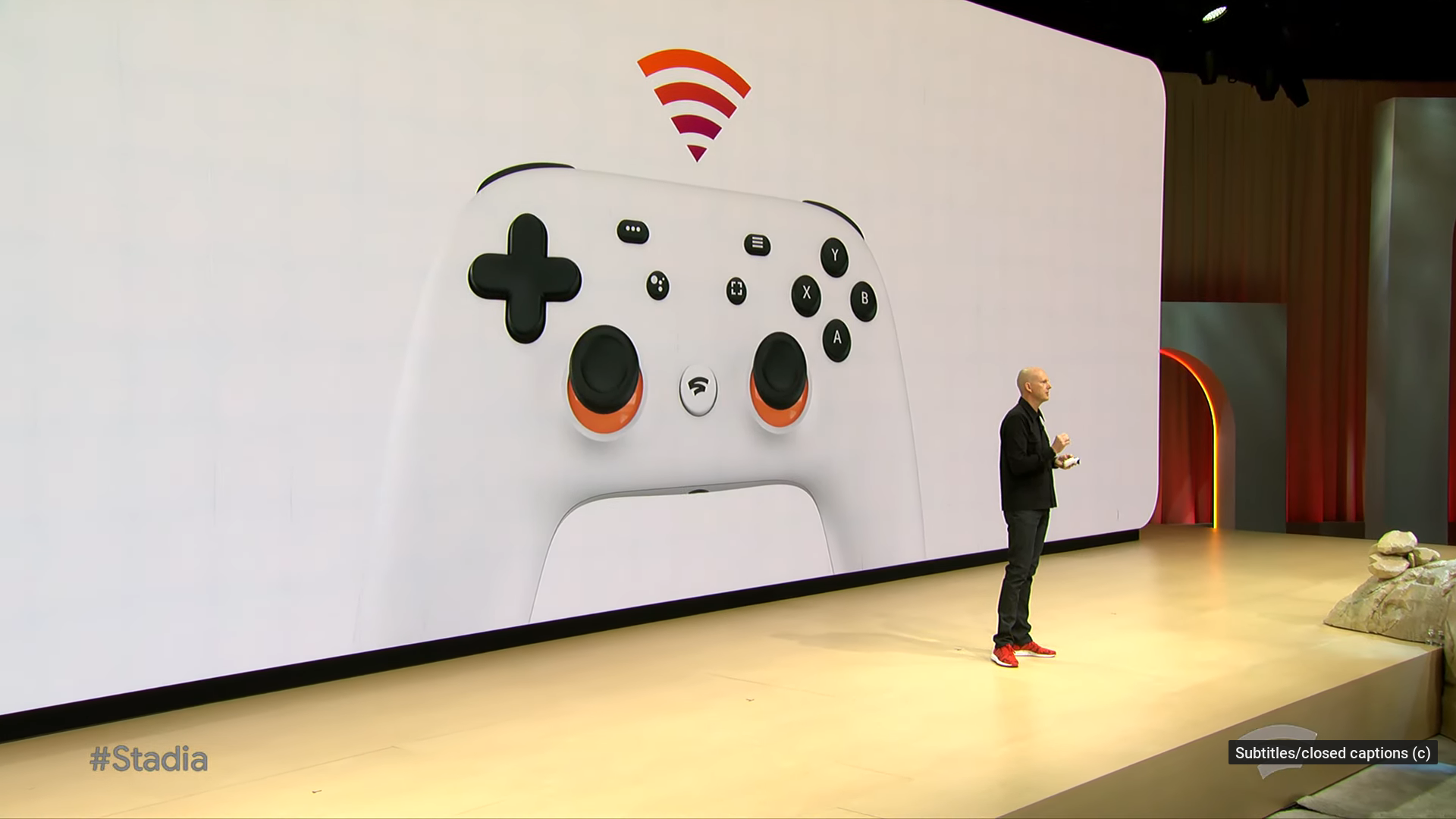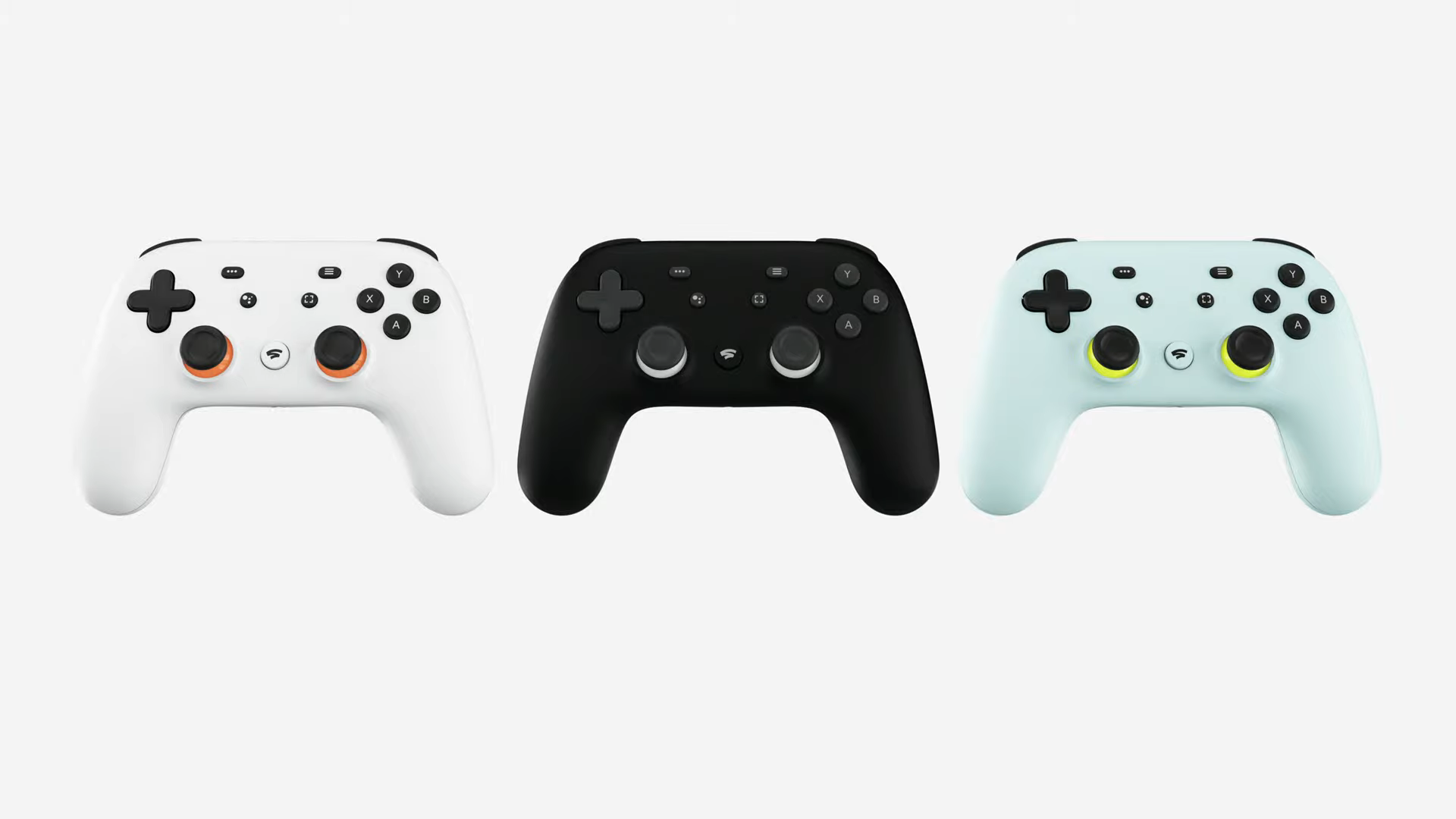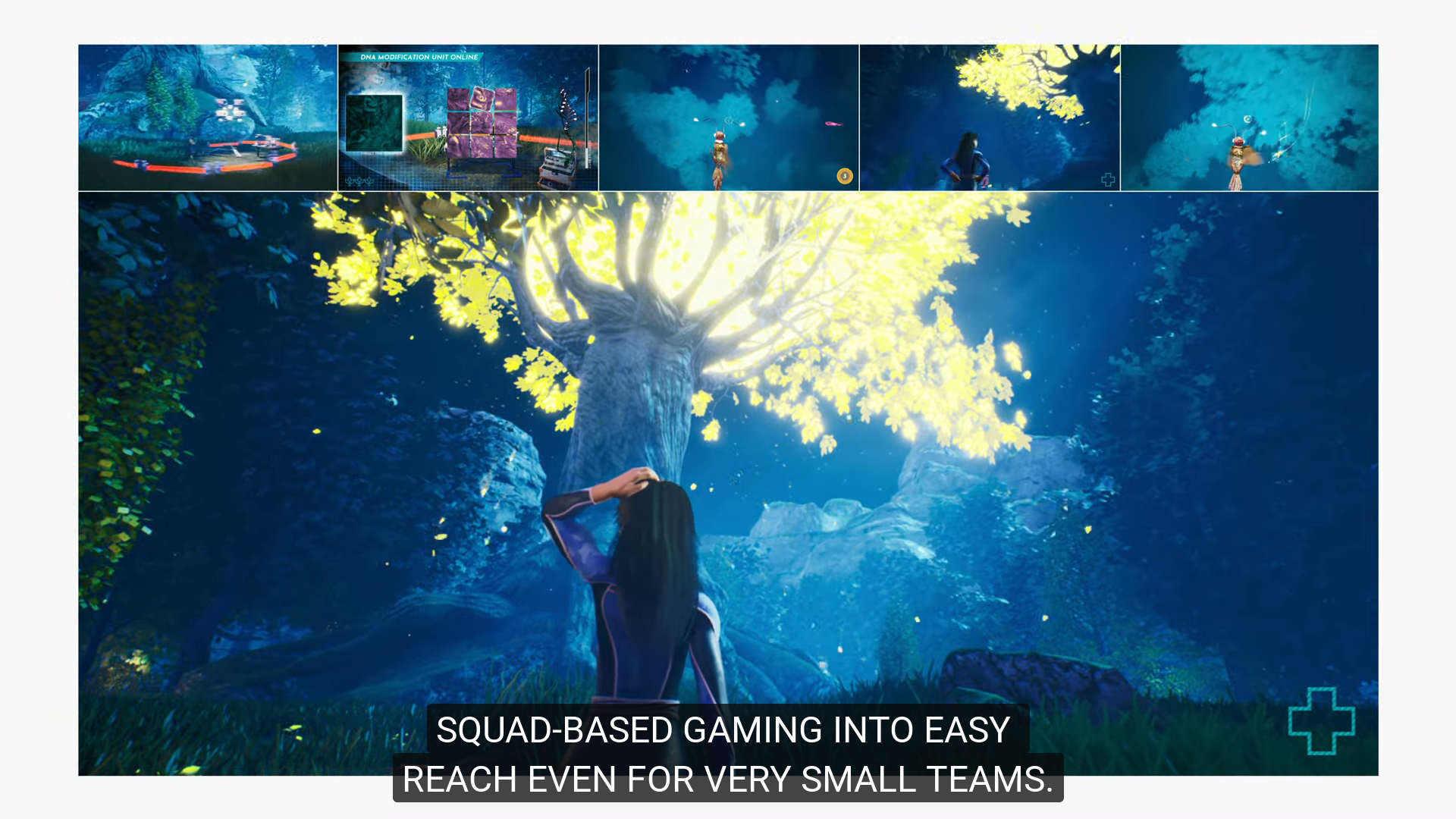Google have now finally unveiled their new cloud gaming service named Stadia, offering instant access to play games in Google Chrome.
What they joked was the worst-kept secret in the industry (no kidding), sounds like quite an interesting service. Certainly one that could eventually end up redefining what gaming is. A little hyperbolic maybe? I'm not so sure considering how easy this should be to jump into a game. On top of that, they very clearly talked about how it's built on Linux (Debian specifically) and Vulkan with custom GPUs from AMD.
Something they showed off, was how you could be watching a game trailer with a button to play it on Stadia and (supposedly within a few seconds) you would jump right into it. That's quite en exciting idea, one that would easily pull in quite a lot of people I've no doubt.
As for resolution, they said it will support 1080p and 4K around 60FPS at release with 8K being worked on as well but that sounds further out if anyone even cares about 8K right now.
They also showed off their new controller, with a dedicated Google Assistant button and a button to capture video immediately for YouTube:
While Google are making their own dedicated gamepad, they did say it will be compatible with other devices too.
They also announced partnerships with both Unity and Unreal Engine and Stadia will "embrace full cross-platform play" including "game saves and progression". They also had id Software, talk about how it didn't take long to bring the new Doom Eternal to Stadia, thanks to how they made the previous Doom game with Vulkan.
This means, that development for Linux is suddenly going to become a priority for a lot more developers and publishers. I don't want to overstate how important that is, but it's a very exciting prospect. This doesn't suddenly mean we're going to see a lot more Linux games on the desktop, but it's entirely possible after they go through all the work to get the games working on Linux with Vulkan for Stadia.
Stream Connect is another service they talked about. They mentioned how developers have pushed the boundaries of gaming but often local co-op is left out, as doing it multiple times in top-end games can require really beefy hardware. With Stadia, each instance would be powered by their servers so it wouldn't be such an issue. They also talked about how if you're playing some sort of squad-based game, how you could bring up their screen to see what they're doing which sounds very cool.
Google also announced the formation of their own game studio, Stadia Games and Entertainment, to work on exclusive games for their new service.
As for support from more external game developers, they mentioned how they've shipped "development hardware" to over 100 developers. From what they said, it should be open to smaller developers as well as the usual AAA bunch.
Stadia is confirmed to be launching this year and it will be first available in the US, Canada, UK and "most of Europe". One thing wasn't mentioned at all—price, but they said more details will be available in the summer. The official site is also now up on stadia.com and developers have their own website to look over.
Google also posted up some extra information on their developer blog:
Google believes that open source is good for everyone. It enables and encourages collaboration and the development of technology, solving real-world problems. This is especially true on Stadia, as we believe the game development community has a strong history of collaboration, innovation and shared gains as techniques and technology continually improve. We’re investing in open-source technology to create the best platform for developers, in partnership with the people that use it. This starts with our platform foundations of Linux and Vulkan and shows in our selection of GPUs that have open-source drivers and tools. We’re integrating LLVM and DirectX Shader Compiler to ensure you get great features and performance from our compilers and debuggers. State-of-the-art graphics tools are critical to game developers, and we’re excited to leverage and contribute to RenderDoc, GAPID and Radeon GPU Profiler — best of breed open-source graphics debugging and profiling tools that are continually improving.
There's probably plenty I missed, you can see their video on YouTube here.
As exciting and flashy as it sounds, it's obviously not Linux "desktop" gaming which is what the majority of our audience is likely interested in. However, things change and if it does become a huge hit we will cover it more often if readers request it. Linux gaming can mean all sorts of things from native games to emulators, Wine and Steam Play and now perhaps some cloud gaming so I don't want to rule it out. However, I can't see this replacing Steam, Humble, GOG, itch.io and so on for me personally.
Obviously there’s still a lot of drawbacks to such a service, especially since you will likely have zero ownership of the actual games so they could get taken away at any time when licensing vanishes. At least with stores like Steam, you still get to access those games because you purchased them. Although, this does depend on what kind of licensing Google do with developers and publishers, it might not be an issue at all but it’s still a concern of mine. Latency and input lag, are also two other major concerns but given Google's power with their vast networks, it might not be so bad.
Also, good luck monitoring your bandwidth use with this, it's likely going to eat up a lot all of it. YouTube and Netflix use up quite a bit just for watching a 30-minute episode of something in good quality, how about a few hours per day gaming across Stadia? Ouch.
That doesn't even address the real elephant in the room, you're going to be giving Google even more of your data if you use this service, a lot more. This is the company that failed to promptly disclose a pretty huge data leak in Google+ after all. I don't want to be some sort of scaremongering crazy-person but it's something to think about.
As always, the comments are open for you to voice your opinion on it. Please remain respectful to those with a different opinion on the matter.
Quoting: jensHaving thought about this and after reading lots of opinions this is my stance:
Googles game streaming service, Strada, seems cross platform. This is certainly a good thing, this offers another way of playing games on Linux. Since Strada uses Linux underneath in their infrastructure I'm pretty sure that this will further improve the quality of the Linux graphics Stack and further strengthen Vulkan.
I'm seeing Strada as a way of playing games _next_ to other means of playing games on Linux, certainly not as a replacement for Steam and other stores. Similar like Netflix it is targeted for the causal (not that much interested in highest quality) consumer and not a replacement for a Blu Ray collection for a Cinematic. So I don't think that Strada will be the end of the way we are playing games now. Though a shift will most likely happen, similar like Netflix grabbed much share of the BluRay market.
Will this improve gaming on Linux in the sense of bringing gaming experience on Linux closer to the experience on Windows? This could go either way. Having games on Strada would make a Linux release technically kind of easy/easier and might be a motivation to just do it. On the other hand publishers might refrain from directly releasing on Linux due to e.g. support reasons and might just refer to Strada, similar like some studios refer to Proton now. Actually I think the latter will happen. It may even worse the situation for real gamers since Linux would only get the low quality Strada game version but not a full Desktop version of a certain game. Though in the long term this could strengthen the Linux market share overall, a similar effect I hope from Proton due to overall having more games on Linux. A higher market share overall could then attract more "native" Linux release. Another thought would be at in the long term, e.g. over 10 years, we wont see differences anymore between Desktop vs streaming and the whole discussion mutes. Thus to conclude: I think Strada will improve gaming on Linux for the causal gamer, but not for "real" gamers, at least not in the short term. No idea what the situation in the long term could yield.
Let's also further see what Valve is doing. I'm still convinced that having Proton/SteamPlay on Linux is mostly just the public Beta test of the groundwork for Valves streaming service.
PS: About the DRM discussion here, Stadia is a service for, lets put it extreme, streaming an interactive movie. Strada is not a platform for buying games/goods thus having a Strada game DRM free does not apply here. And even if they would offer a kind of offline mode (like available in Netflix or Spotify) the DRM people would start a shitstorm anyway because game assets would not be usable outside of a (technically needed) offline Strada client. A Strada game is not a Desktop game.
Edit: Removed a kind of joke that could be take offensive..
Seems like a reasonable summary. We can't really know yet, of course, because Google have declined to discuss any commercial details, possibly because they need to assess reactions, improve streaming to increase the size of the addressable market, increase the game quantity and quality etc.
The end-result of their deliberation may well be that it must be aimed at casual gamers/low quality for financial success, but I get the sense that they would prefer to aim for originality and quality. With appropriate game design, I think their data-centre architecture could surpass the performance and image quality of any PC you could build today. Scalability ( in terms of the number of GPUs contributing to a game instance ) is essentially limited only by the need to move and share data between GPUs.
They also seem to implicitly acknowledge that developers have a high dependency on a Windows workflow, since they support Visual Studio and DirectX shaders. But, I'm sure some benefits for Linux will eventally accrue.
Quoting: skinnyrafIt all boils down to economy. I bought LotR on BluRay. I pay Netflix a monthly fee. I go to a cinema with my family where I pay for a single ticket as much as a discounted DVD costs and yet after 2 hours I have nothing but impressions and memories. Same with VOD services.
Same with games with an added twist: if you include the cost of buying a powerful gaming rig in the cost of owning games, Stadia subscription may be very cost effective.
Yes, I had also VR in my mind where even more power is needed... you would also need more bandwidth, but there could be a turning point in the long term since infrastructure will keep improving.
Quoting: ShabbyXQuoting: yöliskoYou should remember that Google is mainly an advertisement company, and you are their product.
I would be really scared about how detailed a personal profile they can build by learning all your gaming habits and how much they will learn about you by all the choices you make in the games.
All the possibility in the data mining and profiling with these added details of personality through gaming.
And as all the games would be streamed, you are not able to block the data mining by firewalls or by going offline.
Google provides the option not to do personalized advertising if you opt out. You can also download your data to see what's collected, or choose to delete them. You don't need a firewall for that, as there are builtin options in your Google account itself. You are still their product and you get ads, but can choose not to be a subject of machine learning.
You can choose not to trust that Google says the truth. I honestly didn't prior to joining Google. But I can say with good confidence that they don't try to hide the truth (bugs and mistakes happen, which are sometimes mistaken for malicious intent)
"Mistakes", like sniffing everyone's wifi routers, border on, or are actually illegal in some jurisdictions. If Google management do not encourage poor behaviour ( per the motto ), then as a grown-up company they will need to do a lot more to restore trust in their attitude, and the competence of their hiring and management procedures.
Google moved from my "good" bucket to my "bad" bucket over issues like that, and they remain there. Not as bad as Microsoft, or Apple, but not that far from them either.
Quoting: ShmerlGood points there about how they were bitten by too much reliance on HLSL and MS tools. And of course, despite releasing it for Stadia, there is still no desktop Linux version.
What is sad is the fact that Assassin's Creed: Odyssey is available on Steam. Why not release it then? Must not be that much work...
Edit:
https://www.protondb.com/app/812140
Last edited by Mohandevir on 27 March 2019 at 2:17 pm UTC
Last edited by Mohandevir on 27 March 2019 at 2:41 pm UTC
Quoting: MohandevirJust thinking about it... It's probably related to UPlay stuff? Ya know... No UPlay on Stadia but UPlay on Desktop... And no Linux version of UPlay so no Linux version of Assassin's Creed...
The version they made is likely unsuitable for normal use in more ways than just uplay. Think display output (the new Vulkan extensions) and control input handling for instance. Probably also differences with how it stores progress. So even though the biggest component was made to run on Linux, it's not everything that's needed for Steam. And I don't expect them to "bother" with it for less than a percent. It's simply not in the nature of the big publishers.
Quoting: EhvisQuoting: MohandevirJust thinking about it... It's probably related to UPlay stuff? Ya know... No UPlay on Stadia but UPlay on Desktop... And no Linux version of UPlay so no Linux version of Assassin's Creed...
The version they made is likely unsuitable for normal use in more ways than just uplay. Think display output (the new Vulkan extensions) and control input handling for instance. Probably also differences with how it stores progress. So even though the biggest component was made to run on Linux, it's not everything that's needed for Steam. And I don't expect them to "bother" with it for less than a percent. It's simply not in the nature of the big publishers.
Which comes too... No matter the size of the task, just the fact that there is an hurdle, they won't bother, hence SteamPlay.
Last edited by Mohandevir on 27 March 2019 at 2:59 pm UTC
Quoting: Guesthttps://www.youtube.com/watch?v=5I1KvNvUkO4
Just for an interesting perspective from Ubisoft.
--edit: about 11 minutes in, yes, they ported to "Linux" (I assume GNU/Linux) internally when first getting ready for Stadia.
Thanks, that was interesting to watch. Yes, I would say they ported all the CPU code to Linux, or obtained/ported the Linux version of middle-ware they used.
They still use the DirectX shader language, as I would expect most established studios to keep doing for the foreseeable future, but that is host-independent anyway, and can be compiled to any intermediate language.
One notable thing was the start of the talk, which is aimed at developers rather than gamers, where he confirmed what we all suspect, that large parts of the developer community see streaming as the perfect solution to what they consider to be the problem of piracy.
Quoting: ShmerlGood points there about how they were bitten by too much reliance on HLSL and MS tools. And of course, despite releasing it for Stadia, there is still no desktop Linux version.
They still use HLSL and don't seem to have had particular problems with it. For the rest, there was just a highlighting of the fact that where DX12 and Vulkan differ in architecture, you need to design to somehow cater for both, regardless of which you start with. This is roughly in line with other developers have said.
Also worth noting is that having a Stadia/Linux version for a single hardware target is more like having a console version than a desktop version - quality and framerate are fixed. They may be working on completing the Linux support for arbitrary hardware, but personally, I doubt it. The presenter's early comments suggest Ubisoft may be thinking of swapping PC support for Streaming services support.








See more from me